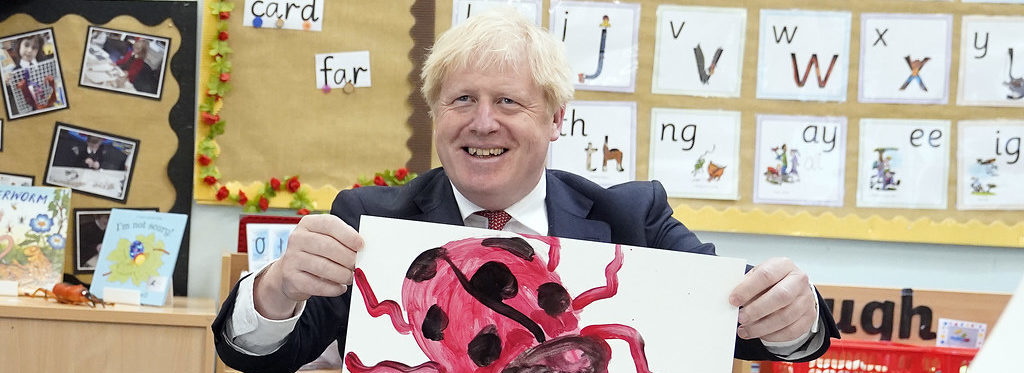Long School Days Won’t Get Children up to Speed Post-Pandemic – Our Privately-Educated Overlords Should Know That
by James McAsh
18 February 2021

For a few weeks now, the government has hinted at its plans to address children’s lost learning during the pandemic. A new “catch-up commissioner” has been appointed, and said he wants to look at the quantity of teaching time that children receive. While no firm decisions have been made, only two possibilities have been publicly mooted: extending the school day and cutting the summer holidays. Both are based on the seemingly intuitive drive to replace lost hours of teaching. The problem is, anyone who works with children knows it won’t work.
There’s no doubt that children’s education has suffered enormously during the pandemic. By next month, most will have spent little more than 15 of the past 52 weeks in school. The period between March and September 2020 was the longest without compulsory schooling since its introduction in 1870; schools were ostensibly open in the autumn but, in reality, were plagued by outbreaks and closures. Since the beginning of January, most children have been learning from home. The earliest they will be back in school is next month, but it could be much longer than that.
Despite teachers’ best efforts, online learning has proven no substitute for the classroom; a recent study claims the current year 2 cohort is two months behind previous years. As always, poorer children suffer most: they are now seven months behind their more affluent peers. This is no surprise, given that approximately 1.5 million children lack appropriate electronic devices in their homes.
The government appears to think that if children make up the hours they’ve lost in the classroom, they will make up the learning, too. But it’s not that simple. Human beings are not robots: without regular breaks, we grind to a halt. This is even truer for children. Any teacher will tell you that the last period is the least productive of the day; ditto the last week of term. Children who are forced to stay in school for longer hours, or during their summer break, will not be effective learners.
Besides, more time in school means less time outside and children have already lost too much of that. 60% of children have spent less time outdoors since the start of the pandemic; for children in low-income households, the proportion rises to 73%. We know that outdoor play is central to human development and children’s mental health; the government’s own environment plan describes it as a “fundamental part of childhood”. It’s how we learn to collaborate, share, and form positive relationships. Following the first lockdown, teachers and psychologists reported an upsurge in fights and fallings-out in the playground. The solution to this is play, not times tables and fronted adverbials.
We cannot make up for lost time, but we can make the most of the time we have. Recruiting more teachers and teaching assistants could reduce class sizes and allocate more time to individual students and small groups. Children who have fallen behind their peers need targeted attention from their teachers. Research published last year suggests that lower-attaining pupils benefit most from smaller classes; individual and small-group tuition are widely recognised to be effective and cost-efficient.
Instead of taking it away, the government should invest in children’s time outside the classroom. This means providing a rich array of extracurricular activities after school and throughout the summer. With rising unemployment, there’s an army waiting to be trained up and deployed as youth workers, sports coaches, musical instructors and drama practitioners.
We are asking children to ‘catch up’ because they have missed out on school. Which means extra schooling.
Why not adapt our curriculum and models of assessment to take into account where they are and what they’ve missed and support our children to succeed?
— The Thinking School (@Thinkingschool2) February 17, 2021
There’s no denying it: all of this will cost money. But if we take the government’s concerns about children’s education at face value, money should be no object. Earlier this month, the prime minister warned that the pandemic’s damage to children’s education is more serious than that to the economy. In fact in the long-term, the two problems are linked: a productive economy demands an educated workforce. If the prime minister’s worries are genuine, surely our post-pandemic education push merits significant spending?
Of course, Johnson should not need persuading. He graduated from the University of Oxford, which sells itself on its tutorial system. His secondary school, Eton College, boasts over 90 clubs and societies, an 8:1 pupil-teacher ratio, and its holidays are eight weeks longer than in the state sector. The private sector has always recognised the innumerable benefitrs of the informal curriculum and small-group tuition – it’s time our privately-educated ministers did, too.
The government is right to worry about children’s education; they have lost time in the classroom and time with their friends. But the solution is not to confine them in school for long hours, or to steal their summer holidays. We need a child-centred approach that balances formal and informal learning and prioritises children’s mental health. Children need time and space to recover from the pandemic, not pressure. They deserve lavish opportunities for play and rich learning experiences in the classroom – the same they have always deserved, and been denied for so long.
James McAsh is a primary school teacher, a Labour councillor and an activist in the National Education Union.